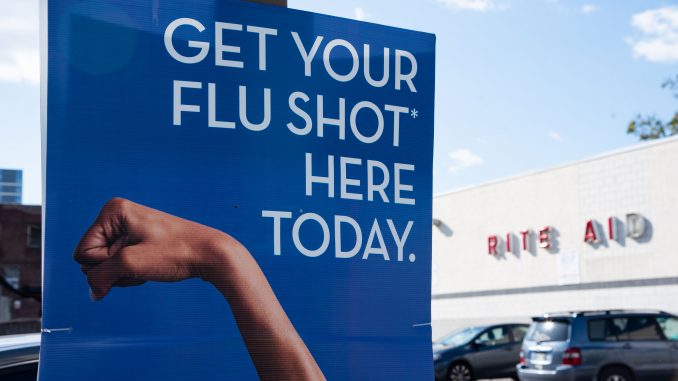
Runny noses and sore throats have taken on a much more dangerous tone as common cold and flu symptoms coincide with Philadelphia’s recent surge in COVID-19 cases, which reached 55,302 total cases on Monday.
“You compound both of them on top of one another and it can lead to some very significant negative outcomes,” said Krys Johnson, an epidemiology and biostatistics professor. “We’ll probably see an uptick in the [COVID-19] death rate just because of the potential for co-infection.”
As the nation faces flu season amid the COVID-19 pandemic, Temple University medical experts recommend students practice the following tips to keep themselves and others healthy, especially as many prepare to travel home for the holidays.
First and foremost, students should get a flu shot, which are offered at many of the drug stores and grocery stores near Main Campus, wrote Mark Denys, director of Student Health Services, in an email to The Temple News.
Students can make an appointment to get a flu shot through Student Health Services, Johnson said. Students can also visit the Rite Aids near Main Campus, like on Broad Street near Oxford or Broad Street near Susquehanna Avenue, to receive a flu shot.
“You don’t want to get the flu, a bad case of it, and end up in the hospital,” said Robert Bettiker, a medicine professor. “We’re already stretched for that.”
COVID-19 cases at Temple University Hospital have surged to 78 patients as of Nov. 10, which is about 2.5 times as many as they had during the summer, Bettiker said. To accommodate the surge in cases, the hospital may convert rooms like the post-anesthesia care unit and outpatient offices into COVID-19 treatment spaces.
Temple reported 49 active COVID-19 cases among students and employees on Monday, The Temple News reported.
Philadelphia averaged 721 new cases of COVID-19 per day last week, the highest since the pandemic began. This prompted city officials to announce new restrictions on Monday, like closing indoor dining and limiting outdoor gatherings, The Temple News reported.
COVID-19 shares many symptoms with the flu, meaning students can prevent the spread of both diseases by practicing Temple’s four public health pillars, which include wearing masks, social distancing, frequently washing hands and health monitoring, Denys wrote.
Another step students can take to protect themselves from either virus is purchasing a humidifier for their bedrooms and setting it to 50 percent, which will prevent cold weather from drying out their throat and nose, Bettiker said.
To mitigate the spread of COVID-19 near Main Campus, Temple is opting to modify or suspend most in-person operations on Nov. 20, so students returning home for fall break will not have to travel back to campus and risk spreading the virus in the process, The Temple News reported.
Students choosing to leave campus for fall break can get tested for COVID-19 at Mitten Hall through Nov. 20 and will receive their results within the same day, The Temple News reported.
While traveling, students should take precautions like wiping down their seats with disinfecting wipes and sitting near open windows when possible, Johnson said.
After arriving home, students should try to quarantine for at least a week and connect with extended family virtually, rather than in person, to minimize the number of people they come into direct contact with, Johnson said.
“You can utilize Zoom or other methods of video-calling that can help you have that social interaction but keep everybody safe this year,” Johnson said. “You can have the big Thanksgiving and Christmas and Hanukkah next year.”
Virtually connecting with others is one of the best ways students can take care of their mental health, particularly during the stress of finals season and the holidays, Bettiker said.
“Some of the normal things that we do to relieve stress and to maintain connectedness to other people are frowned upon now and are no-nos,” Bettiker said. “So you need to make sure that you’re still connected to your friends and your family, and the people that are important to you.”
Students can also avoid gatherings during the holiday season by shopping online rather than in person and ordering takeout from restaurants instead of dining indoors, Johnson said.
Anyone returning to Main Campus after fall break should quarantine when they arrive, even if they do not have COVID-19 symptoms, and get tested for COVID-19 after quarantining for four to seven days, Johnson said.
Because people can contract COVID-19 and the flu at the same time, following these steps could help prevent both diseases from surging in the Temple and North Central communities, Johnson said.
“It will be good to protect you, and to protect the people around you, and help make you a good citizen,” Bettiker added.



Be the first to comment